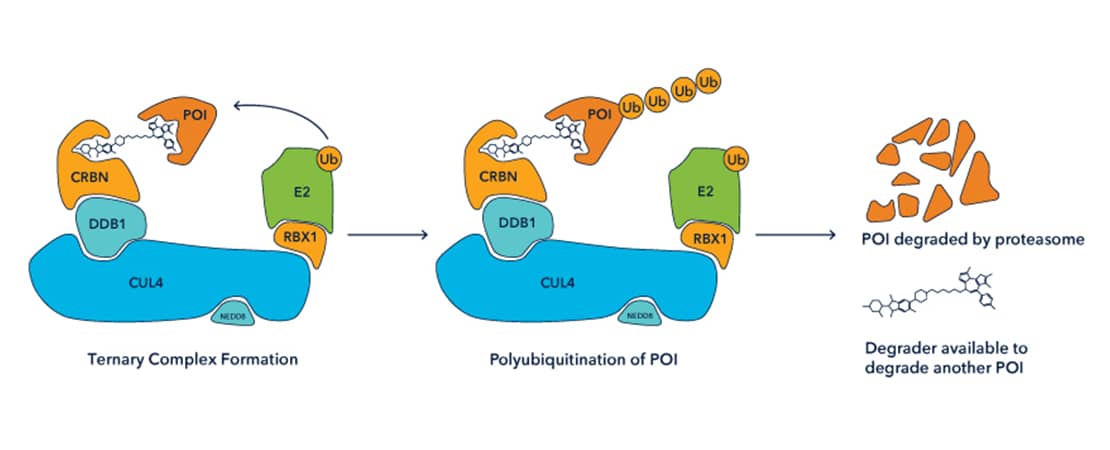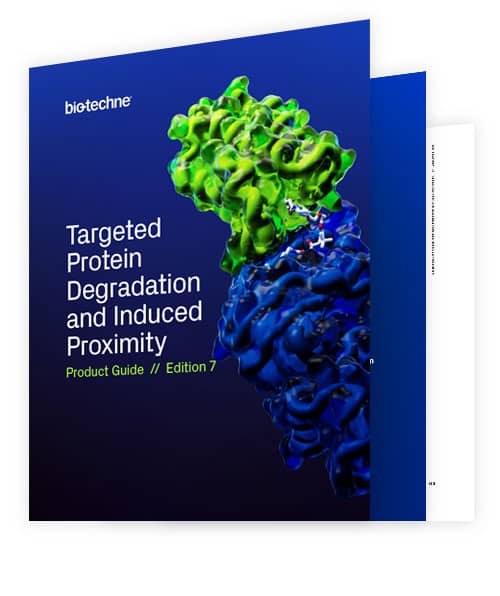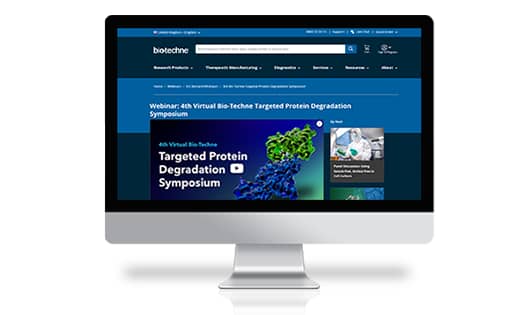Transformative Tools for Induced Proximity and Targeted Protein Degradation
What is Induced Proximity?
Induced Proximity is an approach that employs two ligands covalently joined by a linker, to bring two proteins, a target protein of interest (POI) and an effector, into close proximity. The induced proximity of POI and effector leads to an alteration to the POI, triggering a biological response. The POI can undergo a variety of changes including post-translational modification, degradation, autophagy, stabilization, dimerization, and cellular shuttling.
Targeted protein degradation (TPD) utilizes heterobifunctional small molecule Degraders (e.g. PROTAC® molecules, SNIPERs etc) to bind the POI and recruit an E3 ligase to form a ternary complex. This initiates the ubiquitination of the POI and its subsequent destruction by the proteasome. There are a number of significant benefits to using this technology. Efficient and highly selective protein knock-down can be achieved both in vitro and in vivo. Degraders act catalytically by repeatedly engaging and directing the ubiquitination of the POI and can therefore be used at very low doses to achieve sustained knock-down.
Bio-Techne offers a full range of products and services for Targeted Protein Degradation research and development. Our tools will help you explore and validate your target of interest, develop new protein Degrader molecules and investigate their activity, as well as build your own assays for degradation. Our range includes: small molecule Protein Degraders such as Proteolysis Targeting Chimeras (PROTAC® Degraders), molecular glues, aTAG, dTAG and BromoTag® Degraders plus Degrader Building Blocks, Ubiquitin-Proteasome System Proteins and Assays, Assays for Protein Degradation and Custom Degrader Services.
Products and Services for Targeted Protein Degradation
Target Validation and Exploration
Target Validation, the process of establishing that a potential molecular target is involved in a physiological function or disease process, is a key step in the development of new Degraders, as well as for drug discovery and biological research. Our TAG Degradation platform offers a differentiated method for target validation, using targeted protein degradation to reversibly knockdown a potential protein target and enable exploration of the downstream phenotype.
Degrader Design and Synthesis
Targeted protein degradation can be achieved using small molecule Protein Degraders, such as PROTAC molecules. Bio-Techne provides a toolbox of products and services to support your Degrader Design and Synthesis program and save you time and money, including our PROTAC Panel Builder online tool; a large range of off-the-shelf Degrader Building Blocks; and tools for new E3 ligase ligand discovery.
Assays for Targeted Protein Degradation
Successful development of small molecule Protein Degraders for targeted protein degradation requires a variety of assays to characterize specific aspects of Degrader activity. The assay workflow should explore: target engagement and ternary complex formation induced by the Degrader; ubiquitination of the target protein; as well as target degradation and its downstream consequences. The use of multiple orthogonal assays will increase the chance of successful Degrader development.
E3 Ligase and Ubiquitin Proteasome System Biology
Bio-Techne, through the R&D SystemsTM brand, provides a wide range of products to help you explore and characterize ubiquitin biology. The rapidly expanding portfolio includes highly active E3 Ubiquitin Ligases, including SKP2, VHL, Cereblon (CRBN) and DCAF proteins, as well as assay kits and components, and antibodies. We also provide Cullin-Rbx complexes (including neddylated cullins) that can be coupled to your purified substrate-binding complexes to generate active ligases.
Custom Services for Targeted Protein Degradation
Bio-Techne offers a unique portfolio of custom services to support your PROTAC® discovery and development and target validation programs. Harness our expertise in custom chemistry to develop active degraders to knock down your target of choice or custom building block panels. We also offer custom E3 ligase development services enabling you to build your own assays to investigate ubiquitination.
Resources for Targeted Protein Degradation
Brochure: Targeted Protein Degradation and Induced Proximity
Brochure: Targeted Protein Degradation and Induced Proximity
Our Targeted Protein Degradation and Induced Proximity Research Product Guide highlights the tools and services available from Bio-Techne to support your research including, Protein Degraders, Degrader Building Blocks, Custom Degrader Services, Proteins and Assays for protein degradation, and Tools for Induced Proximity Research.
5th Virtual Bio-Techne TPD and Induced Proximity Symposium
5th Virtual Bio-Techne TPD and Induced Proximity Symposium
Our 5th virtual symposium covered new developments from the leading scientists working in induced proximity research. Topics covered include: transcriptional kinases to activate apoptosis, degradation of BRD9 by a novel “targeted glue”, discovery of protein degraders and stabilizers, mechanisms of degrader-targeted protein ubiquitinability, and degraders of HIV-1 Nef for antiretroviral drug development.
Scientific Review: Simple Western Hits the Bullseye of TPD
Scientific Review: Simple Western Hits the Bullseye of TPD
This review highlights vital publications that represent Simple Western’s high-throughput screening of degrader activity with reproducible quantification, flexible multiplex strategies, and fast time to results, from drug discovery of novel degraders through translation to the clinic.
Paper: Reviewing the Toolbox for Degrader Development in Oncology
Paper: Reviewing the Toolbox for Degrader Development in Oncology
This review discusses the toolbox of guidelines, reagents, and technologies available to support Degrader research and development in oncology.
Video: What is Targeted Protein Degradation?
Video: What is Targeted Protein Degradation?
This short animation explains the fundamentals of Targeted Protein Degradation (TPD) using small molecule Protein Degraders or PROTACs, that harness the ubiquitin-proteasome system to selectively remove proteins from cell.
Webinar: Workflow Solutions for PROTAC® Degrader Development
Webinar: Workflow Solutions for PROTAC® Degrader Development
Originally presented as a tech talk at Cell Bio Virtual 2020 by our Innovation Manager, Hannah Maple, PhD, this webinar presents how Bio-Techne can support your Degrader development program with our comprehensive workflow solution.
Background Information

How do Degrader molecules work?
Targeted Protein Degradation is a technique that uses heterobifunctional small molecule Degraders to bring about efficient and highly selective degradation of a target protein of interest. Targeted protein degradation enables investigation of the downstream consequences of protein knockdown and provides an easy-to-use method for target validation.
Bio-Techne provides small molecule Protein Degraders, including PROTAC (PROteloysis TArgeting Chimera) molecules and TAG Degraders (dTAG/aTAG/BromoTag). PROTAC molecules comprise a ligand that binds a target of interest joined by a linker to an E3 ligase ligand. A ternary complex is formed by the simultaneous binding of the Degrader to the target protein and the E3 ligase, which initiates ubiquitination of the target protein and its subsequent destruction by the proteasome. TAG Degraders work on a similar principle, but comprise an E3 ligase ligand linked to a compound that binds a fusion of a TAG degron with a target protein of interest. Degraders enable the knockdown of proteins for which there are no known ligands, enabling targeting of previously undruggable targets.
Bio-Techne supplies a range of other products and services to support Targeted Protein Degradation studies, including Degrader Building Blocks to enable you to create your own Degraders, as well as Ubiquitin-Proteasome System (UPS) Proteins and Assays, Assays for Protein Degradation, and Custom Degraders Services.
Why Use Degraders?
Small molecule Degraders offer several advantages over genetic manipulation for target protein knockdown:
- Degraders are cell-permeable, are suitable for use in vivo and in vitro, and can be applied directly to cells with no need for transfection or expression vectors.
- They are applicable to multiple cell lines with no requirement that cells are easily transfectable
- The duration of effect is adjustable and reversible on compound washout
- They have a catalytic mode of action repeatedly engaging and directing ubiquitination of target molecules, allowing use at sub-stoichiometric concentrations.
PROTAC® is a registered trademark of Arvinas Operations, Inc., and is used under license.
BromoTag® is a registered trademark of the University of Dundee and is used under license.





